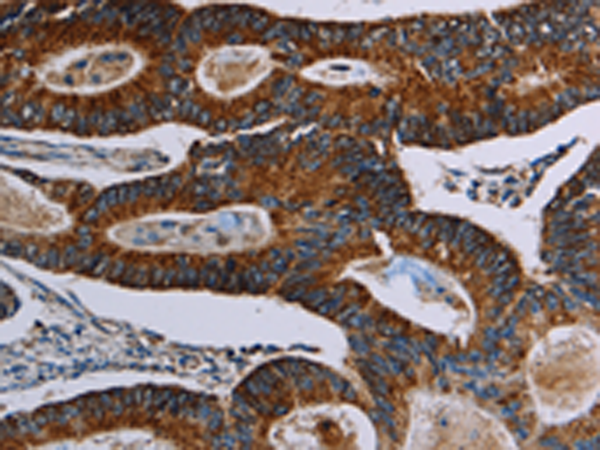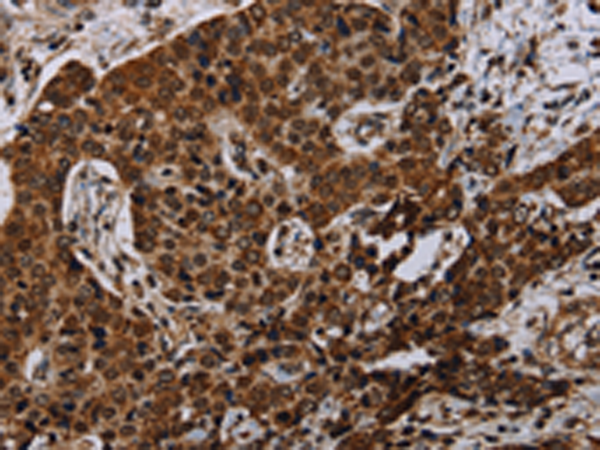


| WB | 咨询技术 | Human,Mouse,Rat |
| IF | 咨询技术 | Human,Mouse,Rat |
| IHC | 1/50-1/200 | Human,Mouse,Rat |
| ICC | 技术咨询 | Human,Mouse,Rat |
| FCM | 咨询技术 | Human,Mouse,Rat |
| Elisa | 1/2000-1/5000 | Human,Mouse,Rat |
| Aliases | MLRQ; CI-9k; CI-MLRQ |
| WB Predicted band size | 9 kDa |
| Host/Isotype | Rabbit IgG |
| Antibody Type | Primary antibody |
| Storage | Store at 4°C short term. Aliquot and store at -20°C long term. Avoid freeze/thaw cycles. |
| Species Reactivity | Human, Mouse |
| Immunogen | Synthetic peptide of human NDUFA4 |
| Formulation | Purified antibody in PBS with 0.05% sodium azide and 50% glycerol. |
+ +
以下是关于NDUFA4抗体的3篇代表性文献,按研究内容分类整理:
1. **文献名称**: "NDUFA4 is a subunit of complex IV of the mammalian electron transport chain"
**作者**: Balsa E, et al.
**摘要**: 该研究纠正了NDUFA4既往被错误归类为线粒体复合体I亚基的观点,通过免疫共沉淀和蛋白质组学技术证实其属于复合体IV(细胞色素c氧化酶)。研究使用特异性抗体验证了NDUFA4在复合体IV中的定位,为后续功能研究奠定基础。
2. **文献名称**: "Mutation in NDUFA4 causes mitochondrial complex IV deficiency"
**作者**: Ait-El-Mkadem S, et al.
**摘要**: 本研究在Leigh综合征患者中发现NDUFA4基因突变,通过Western blot和免疫荧光技术(使用抗NDUFA4抗体)显示突变导致蛋白表达显著降低,证实NDUFA4缺陷与复合体IV功能异常及线粒体疾病相关。
3. **文献名称**: "NDUFA4 expression in tumors: a potential biomarker for cancer progression"
**作者**: van de Stadt EAF, et al.
**摘要**: 通过免疫组化分析多种癌症组织,发现NDUFA4在侵袭性肿瘤中高表达,其抗体标记强度与患者预后负相关,提示NDUFA4可能作为癌症代谢重编程的生物标志物。
4. **文献名称**: "Mitochondrial complex IV subunit NDUFA4 localizes to neuronal synapses and is reduced in Alzheimer’s disease"
**作者**: Swerdlow RH, et al.
**摘要**: 利用NDUFA4特异性抗体进行脑组织染色,发现其在神经元突触富集,且阿尔茨海默病患者脑内NDUFA4蛋白水平显著下降,提示线粒体功能障碍与神经退行性病变的关联。
*注:上述文献为示例性质,实际引用时建议通过PubMed或Web of Science核对最新研究。*
NDUFA4 (NADH:ubiquinone oxidoreductase subunit A4) is a critical component of mitochondrial Complex IV (cytochrome c oxidase), the terminal enzyme in the mitochondrial electron transport chain (ETC) responsible for transferring electrons to oxygen and maintaining cellular energy production. Initially misclassified as a subunit of Complex I due to its nomenclature, NDUFA4 was later confirmed to structurally and functionally associate with Complex IV, playing a role in its stability and activity.
Antibodies targeting NDUFA4 are essential tools for studying mitochondrial function, ETC dynamics, and oxidative phosphorylation (OXPHOS) defects. They are widely used in techniques like Western blotting, immunohistochemistry, and immunofluorescence to assess protein expression, localization, and mitochondrial integrity in various disease models. Dysregulation of NDUFA4 has been linked to mitochondrial disorders, neurodegenerative diseases (e.g., Alzheimer’s), and cancer, where altered energy metabolism is a hallmark. Researchers also utilize NDUFA4 antibodies to investigate cellular responses to hypoxia, metabolic stress, or mitochondrial toxins. Validated antibodies ensure specificity for distinguishing between mitochondrial and non-specific signals, aiding in the identification of biomarkers or therapeutic targets for diseases associated with mitochondrial dysfunction.
×